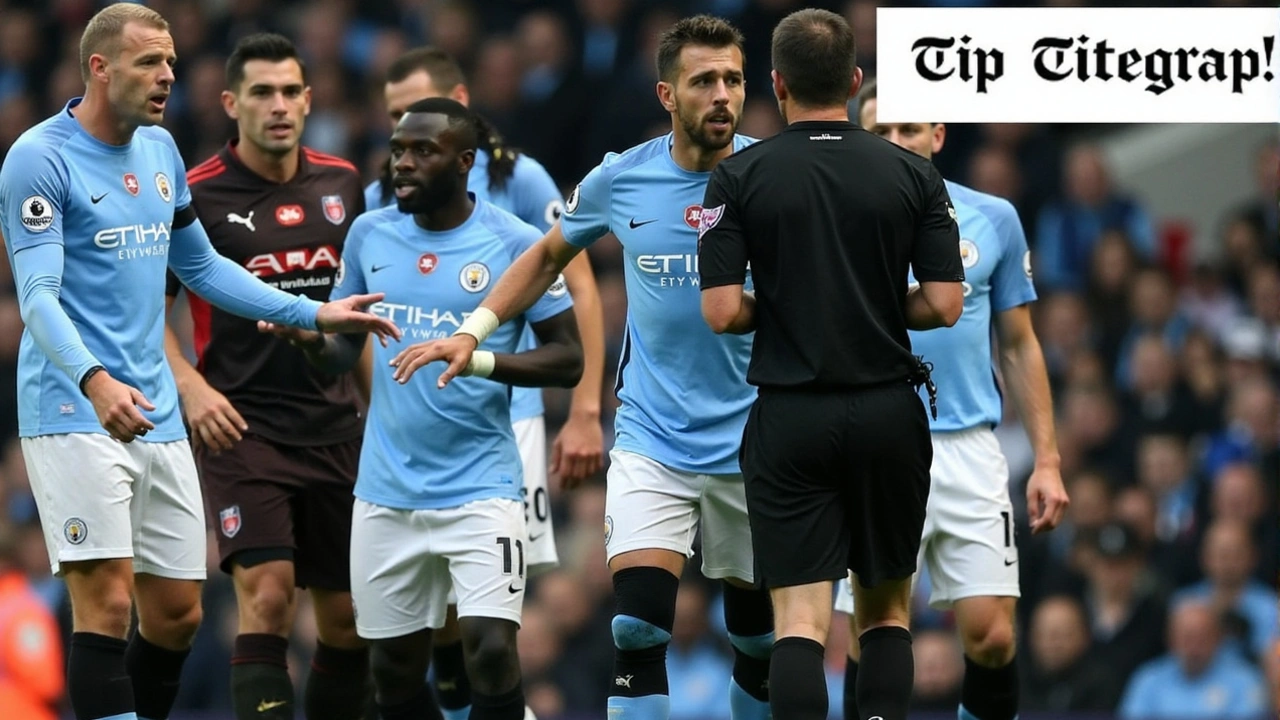Michael Oliver's Refereeing Under Scrutiny in Man City vs Arsenal Clash
In a recent high-stakes clash between Manchester City and Arsenal that ended in a dramatic 2-2 draw, referee Michael Oliver has come under intense scrutiny. Former top-flight referee Keith Hackett has voiced significant criticism of Oliver's officiating, particularly highlighting what he perceives as fundamental errors that impacted the match's outcome.
Controversy Over Arsenal's First Goal
The crux of Hackett's criticism centers around Arsenal's first goal. According to Hackett, Michael Oliver failed to adhere to the basic principles of refereeing. The incident in question occurred after Oliver awarded a free-kick to Arsenal. During this moment, Oliver pulled Manchester City’s captain, Kyle Walker, aside for a discussion, effectively taking him out of position. However, before Walker could return to his designated position, Arsenal took a quick free-kick, which directly led to their opening goal.
Hackett argues that this lapse in judgment by Oliver represents a fundamental error in refereeing. In his view, referees are obligated to ensure that all players, particularly those directly involved in the defense, are in position before allowing play to recommence. By not adhering to this, Oliver inadvertently disadvantaged Manchester City and allowed Arsenal to capitalize on their tactical disarray.
Inconsistencies in Time-Wasting Sanctions
Another significant point of contention raised by Hackett is the inconsistency in how Oliver dealt with incidents of time-wasting. Arsenal's Leandro Trossard received a second yellow card for time-wasting just before the first half concluded, leading to his subsequent dismissal from the match. This incident itself could be seen as fair if it weren't for the preceding actions of Manchester City’s Jeremy Doku. Earlier in the game, Doku kicked the ball away in a manner that could easily be interpreted as time-wasting; however, he escaped any form of sanction.
This disparity did not go unnoticed by Arsenal's players, who pointed out the inconsistency in Oliver's decision-making. Hackett emphasized that such double standards can lead to frustration and confusion among players, ultimately undermining the authority and credibility of the referee.
Balancing Sanctions and Common Sense
Hackett suggests that Oliver's approach to the match was overly cautious, as he seemingly aimed to avoid issuing what could be perceived as 'cheap' sanctions. While a degree of leniency and pragmatism is often beneficial in maintaining the flow and integrity of the game, it should not come at the expense of consistency and fairness. In this instance, Hackett believes the referee's hesitation to penalize Doku for time-wasting, contrasted with his swift action against Trossard, illustrates a lack of balanced judgment.
Furthermore, Hackett underlined that the role of a referee is not just to enforce the rules but also to manage the game with a sense of common sense and intuition. Ensuring that players are positioned correctly and upholding consistent standards across both teams are fundamental to this role. Deviating from these principles, as Hackett believes Oliver did, can exacerbate tensions on the pitch and potentially influence the match's result.
The Bigger Picture: Refereeing Standards in the Premier League
This incident adds to the ongoing discussion about the standards of refereeing in the Premier League. Fans, players, and pundits frequently debate the consistency and quality of officiating, calling for improvements and higher accountability. High-profile matches like Manchester City versus Arsenal often magnify these issues, leading to calls for better training, use of technology, and perhaps even changes in how referees are evaluated and supported.
In conclusion, while officiating is undoubtedly challenging, moments like these are crucial for reflection and growth within the sport. As the Premier League continues to evolve, the standards and practices of refereeing must also progress to ensure fairness, excitement, and integrity in every match.


Shelby Mitchell
September 24, 2024 AT 10:53Jitendra Patil
September 24, 2024 AT 20:55Michelle Kaltenberg
September 25, 2024 AT 04:05Jared Ferreira
September 25, 2024 AT 19:24Kurt Simonsen
September 26, 2024 AT 14:03mona panda
September 26, 2024 AT 16:18Evangeline Ronson
September 27, 2024 AT 02:15Cate Shaner
September 27, 2024 AT 21:04Thomas Capriola
September 28, 2024 AT 06:23Rachael Blandin de Chalain
September 29, 2024 AT 05:19Soumya Dave
September 29, 2024 AT 13:22Chris Schill
September 29, 2024 AT 21:05cimberleigh pheasey
September 30, 2024 AT 20:18Tom Gin
September 30, 2024 AT 21:11Alex Alevy
October 1, 2024 AT 07:47Aileen Amor
October 2, 2024 AT 01:52Danica Tamura
October 2, 2024 AT 13:53